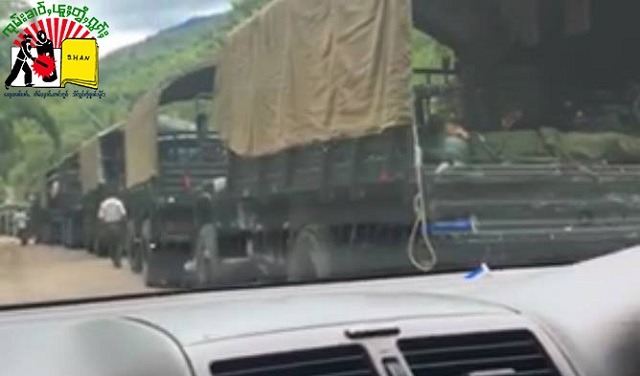The United Wa State Army (UWSA) has reportedly sent more troops into territory under the control of the National Democratic Alliance Army (NDAA) as tensions mount between the two ethnic armed groups.
Speaking to Shan Herald on Wednesday, an NDAA official who asked to remain anonymous said, “Around 150 additional UWSA soldiers arrived in our area by army truck on the evening of October 4.”
Based in eastern Shan State’s Mongla Township (officially known as Shan State Special Region 4), the NDAA has traditionally maintained close relations with the Wa army, which is considered the largest ethnic militia force in Burma with a troop strength estimated at 20,000. Commonly referred to as the Mongla Group, the NDAA has around 3,000 soldiers, according to data from the Myanmar Peace Monitor.
On September 28, the UWSA sent in its Battalion 468 – some 600 troops pulled into NDAA territory in about 60 trucks. The Wa forces seized three NDAA bases: two mountain bases, Loi Kiusai and Loi Hsarm Hsoom, and a checkpoint at Parng Mark Fai. More than 150 NDAA guards were captured in the raids.
“On September 30, they released 17 soldiers,” said the same Mongla official. “On October 2, they released another 138 soldiers, so all the detained soldiers have now been released.”
He added that Parng Mark Fai checkpoint, which lies 100 kilometers from Kengtung Township, was handed back to the NDAA. However, he said that Pao Aik Pang, the commander of UWSA Battalion 468, had informed NDAA officials that the two mountain outposts would not be returned to them.
“These two outposts are very high and are good for planning military strategy,” said the Mongla official. “We can see Kengtung Township from these two mountains.”
UWSA commander Pao Aik Pang was charged with involvement in a massive heroin haul seized in eastern Shan State’s Mong Peng Township in 2005. He was pardoned and released from prison during the tenure of President Thein Sein.
Khuensai Jaiyen, the director of the Pyidaungsu Institute for Peace and Dialogue, suggested two possible reasons for the new conflict between these former allies; first, because the UWSA had requested the NDAA send a low-ranking delegation to attend the 21st Century Panglong Conference, the national peace talks led by Burma’s State Counselor Aung San Suu Kyi. However, the NDAA leader Sai Luen himself joined the conference.
Secondly, the Mongla has demanded a self-administered zone for the Akha ethnic minority, while the UWSA had itself proposed setting up a self-administered Wa state at the Panglong Conference.
By Shan Herald Agency for News












Leave a Comments